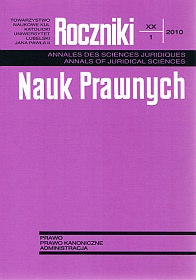Prawo naturalne jako pojęcie zbiorcze niepozytywistycznych teorii prawa
Abstrakt
The author of the article emphasizes that if a distinction between legal positivism and natural law is to be made, the definition of law must be such that it could be employed for both concepts of law. Law, in contrast to moral norms, can be defined as a social norm which it is possible to impose under compulsion. The notion ‘compulsion’, however, should be construed in a way that would permit it to be used in both the positivist theory of law and that based on natural law.
Natural law is not an array of ultimate legal norms, but it manifests itself in practical reasoning which recognizes rules that substantiate existential goals in a given society with regard to all of its economic and social conditions. Natural law grows as culture and social bonds develop, especially social awareness of the members, yet it is not equal to these social factors. It provides an opportunity for a critical evaluation of the existing economic relations as well as social relations in general. In terms of natural law, this means that practical reason is tuned to the content which is ultimately related to the existential goals of man. The timeless character of natural law does not hinge upon an ultimate formulation of fundamental legal norms but rather on the dynamic power of practical reason so that it should be possible to formulate legal norms anew which would permit a realization of existential goals of man, using both external and internal (i.e. experience of values) types of experience.
Copyright (c) 2010 Roczniki Nauk Prawnych

Utwór dostępny jest na licencji Creative Commons Uznanie autorstwa – Użycie niekomercyjne – Bez utworów zależnych 4.0 Międzynarodowe.


